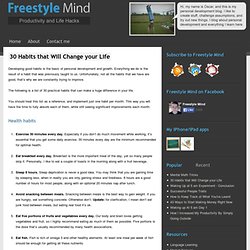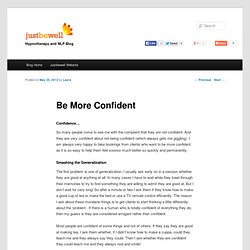

7 Not So Obvious Habits To Maximize Your Productivity. I was a big fan of productivity, and, in some respects, I still am.

I’ve been a very early adopter of GTD, and, for years, I did my weekly reviews with the discipline of a zen monk. But, eventually, I hit a roadblock. GTD is about getting things “done”, but in life we have much more to experience than “doing”. We feel. How to Stop Worrying. Undoing the Worrying Habit Once acquired, the habit of worrying seems hard to stop.

We're raised to worry and aren't considered "grown up" until we perfect the art. Teenagers are told: "you'd better start worrying about your future". If your worries aren't at least as frequent as your bowel movements, you're seen as irresponsible, childish, aimless. That's a "responsible adult" game rule. To the extent that worrying is learned/conditioned behaviour, it can be undone. Centuries-old cultural conditioning has given us a nasty neurosis: the belief that happiness must be "earned". Laid on top of the first neurosis is the idea that spending money will make you happy.
So: we never stop working, we never stop spending money, we're never really happy – ideal conditions, coincidentally, for a certain type of slave economy. You won't stop worrying if you think it serves you. The fight-or-flight response (FOF) is useful on rare occasions of real danger. Thought Questions - Asking the right questions is the answer.
- StumbleUpon. Developing good habits is the basic of personal development and growth.

Everything we do is the result of a habit that was previously taught to us. Unfortunately, not all the habits that we have are good, that’s why we are constantly trying to improve. The following is a list of 30 practical habits that can make a huge difference in your life. You should treat this list as a reference, and implement just one habit per month. This way you will have the time to fully absorb each of them, while still seeing significant improvements each month. Health habits Exercise 30 minutes every day. Productivity habits Use an inbox system. Personal Development habits Read 1 book per week. Career habits Start a blog. What do you think? Update: A reader put together a downloadable copy of all these habits. Be More Confident. Confidence… So many people come to see me with the complaint that they are not confident.

And they are very confident about not being confident (which always gets me giggling). I am always very happy to take bookings from clients who want to be more confident as it is so easy to help them feel sooooo much better so quickly and permanently. Smashing the Generalization. Maslow Self Actualization - unlearn. "Self Actualization is the intrinsic growth of what is already in the organism, or more accurately, of what the organism is.

" Abraham Maslow Maslow studied healthy people, most psychologists study sick people. The characteristics listed here are the results of 20 years of study of people who had the "full use and exploitation of talents, capacities, potentialities, etc.. " Self-actualization implies the attainment of the basic needs of physiological, safety/security, love/belongingness, and self-esteem. Maslow's Basic Principles: The normal personality is characterized by unity, integration, consistency, and coherence. Realistic Realistically oriented, SA persons have a more efficient perception of reality, they have comfortable relations with it. Acceptance Accept themselves, others and the natural world the way they are. Spontaneity, Simplicity, Naturalness Spontaneous in their inner life, thoughts and impulses, they are unhampered by convention.
Problem Centering Peak experiences Creativity. Ring the Bells That Still Can Ring: Letting Go of Perfectionism. Of all of the concerns clients bring to therapy, perfectionism can be one of the most relentless and the most difficult to overcome.

It shows up under any number of guises, from the more mundane to more serious versions: “I’m not going to try to learn how to waterski because I know I won’t be any good at it.” “Anything less than an A is not a good enough grade.” “I need to punish myself for not being perfect.” Perfectionists engage in multiple problematic thoughts, feelings, and behaviors. A shameful belief about inner “badness” often is at the core of perfectionism. Instead of looking to the mirror, perfectionists also typically look outside themselves for appraisal and approval. For the perfectionist, the concept of self-esteem rises and falls on the tide of external feedback. So how does one begin to let go of perfectionism?
Leonard Cohen, in his iconic song “Anthem,” offers some insight into this question. There is a difference between healthy striving and grasping for perfection. 30 Things to Stop Doing to Yourself. 10 Things To Stop Caring About Today.